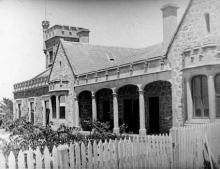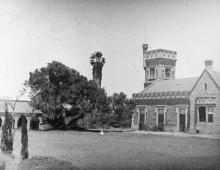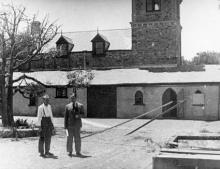Adelaide (Semaphore South)
St Francis House was established as the Church of England Hostel for Inland Children in 1945, as a place for young Aboriginal and Torres Strait Islander boys to further their education . While some parents gave consent for their children to attend St Francis House in the belief that they would receive more schooling, the promises of a better future turned out to be untrue for many . A former resident spoke of the years 1949-1952 as the "most authoritarian regime at St Francis House": the house manager used a "one metre rubber hose" to enforce his orders . He physically abused the children either to wake them up or because they had stayed too long in the shower, though their "overstay may only have been by seconds" .
1Established in 1946, closed in 1959.
St Francis HouseKaren George and Gary George, St Francis House (1946 - 1959) (29 May 2015) Find & Connect https://www.findandconnect.gov.au/ref/sa/biogs/SE00015b.htm
Gordon Briscoe, Racial Folly: A Twentieth-Century Aboriginal Family (Australian National University Press & Aboriginal History Incorporated, 2010), 62
Gordon Briscoe, Racial Folly: A Twentieth-Century Aboriginal Family (Australian National University Press & Aboriginal History Incorporated, 2010), 81
SATharawal Local Aboriginal Land Council
https://www.tharawal.com.au/who-we-are
Tharawal Local Aboriginal Land Council, Who We Are, Tharawal Local Aboriginal Land Council https://www.tharawal.com.au/who-we-are
Kaurna nation Kaurna language Nunga Anangu in Central Australia SAI can remember this utility with a coffin on top with flowers. As a little boy I saw it get driven away knowing there was something inside that coffin that belonged to me. I think I was about six years old at the time. This was the time of our separation, after our mother passed away. My family tried to get the Welfare to keep us here ... trying to keep us together. Aunty D in Darwin - they wouldn't allow her to keep us. My uncle wanted to keep me and he tried every way possible, apparently, to keep me. He was going to try and adopt me but they wouldn't allow it. They sent us away.
As a little kid I can't remember what was going on really, because I was a child and I thought I was going on a trip with the other brothers. I just had excitement for going on a trip. That's all I can think of at the time.
When St Francis [orphanage] closed up, they sent us out to different places. My second eldest brother and I went to a Mrs R. And my only recollections of that lady was when we first went there. We were greeted at the door. The welfare officer took us into this house and I can remember going into this room, and I'd never seen a room like it. It was big, and here me and my brother were going to share it. We put our bags down on the floor. We thought, 'This is wonderful'. As soon as the welfare officer left, Mrs R took us outside that room and put us in a two bed caravan out the back.
I was sleeping in the caravan. I was only a little boy then. In the middle of the night somebody come to the caravan and raped me. That person raped me and raped me. I could feel the pain going through me. I cried and cried and they stuffed my head in the pillow. And I had nobody to talk to. It wasn't the only night it happened.
Oh God, it seemed like night after night. It seemed like nobody cared. I don't know how long it went on for, but night after night I'd see the bogey man. I never saw the person. I don't know who that person was.
Then we were all taken away again to a new home, to another place. We were shunted from place to place, still trying to catch up with schooling, trying to find friends. I had none. I just couldn't find anybody. And when I did have a friend I was shunted off somewhere else, to some other place. Wanting my mother, crying for my mother every night, day after day, knowing that she'd never come home or come and get me. Nobody told me my mother died. Nobody ...
They shifted us again and that was into town again. And then they put us in with this bloke ... They've got records of what he did to me. That man abused me. He made us do dirty things that we never wanted to do. Where was the counselling? Where was the help I needed? They knew about it. The guy went to court. He went to court but they did nothing for me, nothing. They sent us off to the Child Psychology Unit. I remember the child psychologist saying, 'He's an Aboriginal kid, he'll never improve.
He's got behavioural problems'. I mean, why did I have behavioural problems? Why didn't they do anything?
Why did I have behavioural problems?
I hit the streets of Adelaide. I drank myself stupid. I drank to take the pain, the misery out of my life. I couldn't stop. I smoked dope, got drugs. I tried everything. I did everything. I just couldn't cope with life. I lived under cardboard boxes. I used to eat out of rubbish bins. I'm so ashamed of what I've done.
I suffer today. I still suffer. I can't go to sleep at night. It's been on for years. I just feel that pain. Oh God, I wake up in the middle of the night, same time. My kids have asked me why I get up in the middle of the night and I can't explain it, I can't tell them - shamed. I can't sleep too well with it. I can't go to bed. I leave it 'til 12 o'clock sometimes before I go to bed. I lay there awake, knowing I'm gonna wake up at that time of the morning, night after night. I often wish I was dead. I often wish I was gone. But I can't because of my children. You can't explain this to your kids. Why did this happen? I had nobody.
I've had my secret all my life. I tried to tell but I couldn't. I can't even talk to my own brothers. I can't even talk to my sister. I fear people. I fear 'em all the time. I don't go out. I stay home. It's rarely I've got friends.
I wish I was blacker. I wish I had language. I wish I had my culture. I wish my family would accept me as I am. We can't get together as a family. It's never worked. We fight, we carry on. I've always wanted a family (p. 321-322).
Confidential evidence 553, Northern Territory: man removed from Alice Springs to Adelaide in the 1950s.
Human Rights and Equal Opportunity Commission, Bringing them Home: National Inquiry into the Separation of Aboriginal and Torres Strait islander Children from Their Families (1997)
6 years Confidential evidence 553 - WilliamPg. 130 & 135. All the teachings that we received from our [foster] family when we were little, that black people were bad ... I wanted my skin to be white. Pg. 207. I couldn't deal with it, I couldn't accept my father and his family. They were like strangers to me. Confidential evidence 132, Victoria: fostered at 10 years in 1964.
130, 135, 207
10 Confidential evidence 132
St Francis House, 1975

St Francis House, 1975

St Francis House, 1975
